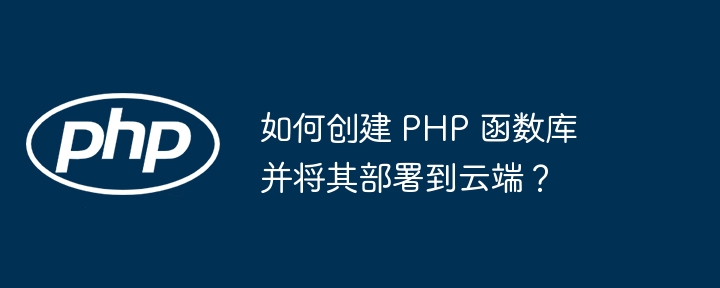Heim >Backend-Entwicklung >PHP-Tutorial >Wie erstelle ich eine PHP-Bibliothek und stelle sie in der Cloud bereit?
Wie erstelle ich eine PHP-Bibliothek und stelle sie in der Cloud bereit?
- 王林Original
- 2024-04-28 10:03:01418Durchsuche
如何创建和部署 PHP 函数库到云端:创建 PHP 项目并定义函数。在 composer.json 中添加函数库元数据。使用 AWS Lambda 或 Google Cloud Functions 部署函数。利用函数库处理表单提交,打印结果。

如何创建 PHP 函数库并将其部署到云端
创建函数库
- 使用 Composer 创建一个新的 PHP 项目:
composer init
- 创建一个
src/FunctionLibrary.php文件,并在其中定义函数:
<?php
function my_function($param1, $param2): string
{
return "Hello from my function: $param1, $param2";
}- 在
composer.json文件中添加函数库元数据:
{
"name": "my-function-library",
"type": "library",
"autoload": {
"psr-4": {
"MyFunctionLibrary\\": "src/"
}
}
}部署到云端
使用 AWS Lambda
- 创建一个新的 AWS Lambda 函数:
- 在 AWS 控制台中转到 Lambda 服务。
- 单击“创建函数”。
- 选择“从头开始创建函数”。
- 为函数命名并选择“Python 3.8”作为运行时。
- 在代码编辑器中,将函数库源代码复制并粘贴到
handler.py文件中。 - 部署函数。
使用 Google Cloud Functions
- 创建一个新的 Google Cloud Function:
- 在 Google Cloud 控制台中转到 Cloud Functions 服务。
- 单击“创建函数”。
- 选择“HTTP”作为触发器。
- 函数名称和区域。
- 在代码编辑器中,选择“PHP 7”作为运行时。
- 将函数库源代码复制并粘贴到
index.php文件中。 - 部署函数。
实战案例
假设我们希望使用函数库中的 my_function() 函数来处理表单提交:
PHP 代码
<?php use MyFunctionLibrary\FunctionLibrary; $name = $_POST['name']; $email = $_POST['email']; $result = FunctionLibrary::my_function($name, $email); echo $result;
HTML 表单
<form action="submit.php" method="post">
<input type="text" name="name" placeholder="Name">
<input type="email" name="email" placeholder="Email">
<input type="submit" value="Submit">
</form>部署后的效果
当用户提交表单时,PHP 代码将使用部署在云端的函数库中的 my_function() 函数处理提交,并打印结果。
Das obige ist der detaillierte Inhalt vonWie erstelle ich eine PHP-Bibliothek und stelle sie in der Cloud bereit?. Für weitere Informationen folgen Sie bitte anderen verwandten Artikeln auf der PHP chinesischen Website!
Stellungnahme:
Der Inhalt dieses Artikels wird freiwillig von Internetnutzern beigesteuert und das Urheberrecht liegt beim ursprünglichen Autor. Diese Website übernimmt keine entsprechende rechtliche Verantwortung. Wenn Sie Inhalte finden, bei denen der Verdacht eines Plagiats oder einer Rechtsverletzung besteht, wenden Sie sich bitte an admin@php.cn
Vorheriger Artikel:Wie erstelle ich eine PHP-Funktionsbibliothek und verwende sie?Nächster Artikel:Wie erstelle ich eine PHP-Funktionsbibliothek und verwende sie?

